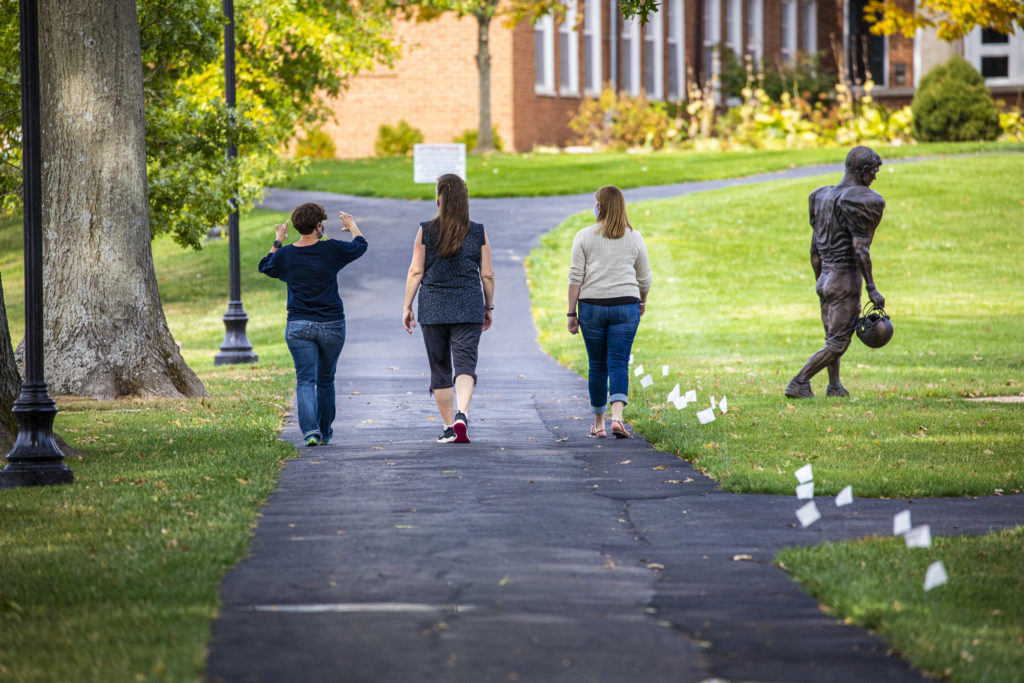Conferences took place Wednesday, Thursday, and Friday of this week for all divisions. While we normally welcome all parents and Middle and Upper School students to campus for conferences, this year we had to get a little creative. Teachers created virtual Zoom rooms to host their conferences, and enabled the Waiting Room feature. As families “arrived” for their conferences, they waited to be let into their Zoom conference room by their teacher.
At conferences each year, parents, students, and teachers have the opportunity to receive and give feedback on what’s going on in the classroom, keeping the lines of communication open and honest.
It’s especially important that Middle and Upper School students take the lead in their conferences. MICDS moved to this student-driven format in 2014 for two main reasons. First, research suggests that student ownership of the conference process further solidifies their ownership of their learning in general and accelerates their learning in the process. Second, the format keeps the focus on the students and their growth rather than grades.
“One of the main points of the conference is that students should know what they don’t know and know how to get there,” said Scott Small, Head of the Upper School.
Students should be able to share the learning targets in each of their classes (both content and skill-related) and reflect on their strengths and weaknesses in achieving these targets and strategies moving forward. Students are empowered to lead their conferences, with support from their teachers to clarify issues and concerns that stray from student growth. Parents, who are the “audience” in conferences, are encouraged to ask questions while focusing on how best to support their students in their responsibilities.
This doesn’t all just happen during conferences, though. Students work with their teachers and advisors to prepare for the logistics of conducting their conferences, including working on speaking skills and time management. Sometimes, if appropriate, students share portfolio work to show progress in academic work and character traits, visually highlight strengths and weaknesses, and corroborate their narrative.
“They take pride in what they can do and take responsibility for what they need to work on. Education stops being something done to them and begins being something that they are leading. »
Scott Small
Prompts for students to reflect on before their conferences include:
- In this class, we have been working on…
- So far this trimester, I have especially enjoyed when we…
- I am most successful in the following areas….
- It takes me the most work to be successful in the following areas….
- Going forward, I am going to focus the most on developing my work in this class in the following ways…
Working through these prompts helps students articulate what skills and understandings they have, what areas still challenge them, and where they hope to get to.
Head of the Middle School Jen Schuckman said, “As a teacher, I deeply appreciated the opportunity to empower my students to speak about how they learn and how I could support them in the process. I learned a lot about my own teaching by seeing how clearly students could reflect and identify areas of strength and areas for improvement. As an administrator, this model offers the ideal opportunity to leverage our Parent-School Partnership as we come together to support students. The students are given the space and time to connect school and home and feel the strength of the adults around them while setting the course for their own growth. This is a community highlight each year as we join together in common purpose in support of The Mission. And as a parent, I leave conferences with such a sense of calm as I know my child is experiencing some of the very best teaching and learning there is. I am in awe of our faculty and how well they know my son and how dedicated they are to his success as well as their own professional practice.”
“By design, the teacher-student-parent conferences emphasize what is quintessentially illuminating and effective about the MICDS experience,” said Brian Thomas, Assistant Head of School. “The partnership between home and school is important and sacred. Students lead their own conferences, in their own voice. If these fall conferences are about charting a course and setting sail, then the rest of the year often indicates how good those maps and plans have been. Like many of our parents, we believe that it matters not just what is taught but who teaches our children. It makes a difference when we spend the time to get to know each other well.”
This year, teachers reported some unforeseen benefits to our Zoom conference format. Many more parents were able to attend the conferences since they could call in from anywhere. One family in China was able to take advantage of the technology to meet with their son’s teachers and remarked that they had never heard him speak so much English. Some teachers conducting their calls on campus took advantage of the nice weather and took brief, 10-minute walks each hour between calls, giving them a welcome break from the screens and an opportunity to move and stretch.

Thank you to all those in the MICDS community–teachers, students, parents, staff–who put in time and energy to making these conferences such a valuable experience.
